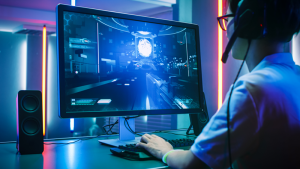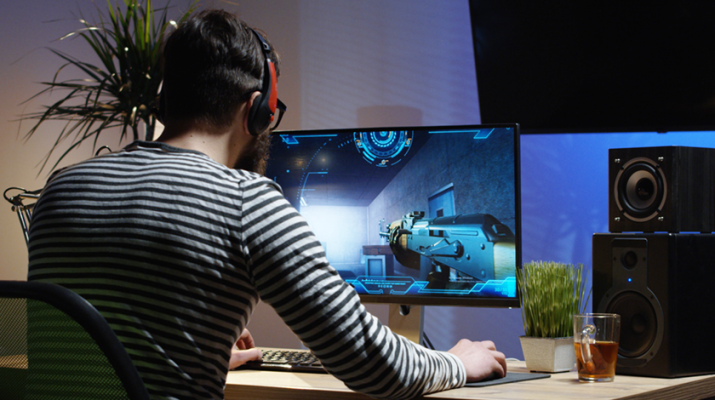By Deborah Jeanne Sergeant
 The World Health Organization has classified excessive video gaming as a disorder, and the American Psychiatric Association has included “internet gaming disorder” as a diagnosis.
The World Health Organization has classified excessive video gaming as a disorder, and the American Psychiatric Association has included “internet gaming disorder” as a diagnosis.
What is so captivating about excessive gaming that players can, essentially, become dependent on it? Isn’t it just another fun pastime for children and teens?
Timothy William Logsdon, licensed mental health counselor with Inner Quest Counseling Services in Amherst and Tonawanda, said that gaming possesses addictive quality that other hobbies don’t.
“They’re made to be that way,” he said. “Game designers have taken advantage of all the bells and whistles, following the lead of the gambling industry. They’ve spent a lot of time and money to see what draws people in and what keeps them there. They bombard the sense with sound and sight and it’s so intertwined.”
While children 35 years ago had to haul quarters to the mall’s arcade or visit their one friend lucky enough to own a home game system, today’s children have 24-7 access on laptops, tablets and phones.
The gaming world also allows users to connect with others with similar interests in real time as they vicariously live in imaginary worlds as a break from the mundane real world and a self image they may not like.
“Life is hard and people want a distraction, whether teenagers dealing with all the normal hormonal and sociological and social media issues that are current these days or adults dealing with a slew of adults responsibilities,” said Nicole S. Urdang, licensed mental health counselor and holistic psychotherapist in private practice in Buffalo. “Everyone wants an escape.”
Urdang said that because of the readily availability of video games — just punch a few buttons and it’s always ready — video games offer an easy and constantly available escape.
“It’s mesmerizing,” she added. “It involves hooking you visually with constantly changing images, hooking you intellectually with various and increasingly difficult challenges, and hooking you emotionally, especially if you a have an avatar in a role-playing game.”
The pleasure center craves more and more stimuli to remain satisfied. When this phenomenon occurs, many gamers lose awareness of what they’re doing or the passing of time. And that “zoned out” feeling enhances the experience for gamers who want to escape their lives. They become dependent upon gaming as a coping mechanism.
Some gamers may feel frustrated by their inability to succeed in their daily lives; however, while playing games they can save the day, win the race or beat the bad guys. But spending too much time gaming and talking about gaming constantly can indicate a problem.
“If someone of any age is neglecting basic things in life, like hygiene, essential self care, eating, exercising, homework responsibilities, then, clearly, they have a problem,” Urdang said.
Obsessive video gaming looks on many levels like addictive behavior.
“You can see personality changes while gaming, like hyperactivity and/or the opposite: no ambition or initiative outside of gaming,” said Shawn Marie Cichowski, professional coach and owner of WNY Life Coaching Center in Williamsville and East Aurora. “When it gets to a point that it’s extreme, that they lose track of eating and sleeping, it’s a problem.”
Cichowski said that addressing this issue can be difficult for some parents; however, they must limit gaming, along with providing wholesome activities and seeking professional help to address any underlying issues.
“Give them experiences outside technology,” she said. “Go outdoors. There’s something powerful in that. Connect with nature and engage them with activities that can get them active again.”
Instead of scheduling numerous activities to keep children occupied, she said that just the opposite can be helpful when they’re younger: let them get bored, so they use their imagination to find something healthful to do. They may make a few real-life friends along the way, too.
Kristi P. Smith, licensed clinical social worker in private practice in Williamsville, said that she’s treated teens who developed social anxiety because they became so wrapped up in the online gaming world. She feels that their gaming disrupted their normal social development.
Smith said that forcing a child or teen to quit cold turkey won’t work, but gradually decreasing the amount of time gaming and replacing it with an enjoyable activity. Making gaming a reward or its removal a punishment makes gaming more precious to teens; however, she also said that helps to prioritize other activities first.
“Make it more a down part of their day,” she added. “Do gaming after their homework. Make sure they realize that this isn’t healthy and you want them to improve. But don’t dismiss it as unimportant to them. Kids feel they’re not heard. To this generation, it’s their whole world.”
In the meantime, the child may form real world friendships as they participate in a sport, club or activity with others.
If these measures don’t work, Smith suggested meeting with a therapist. Surprisingly, children and teens will open up to a therapist even if they won’t to their parents.
Other helpful resources include Online Gamers Anonymous (www.olganon.org), Smart Recovery (www.smartrecovery.org) and Celebrate Recovery (www.celebraterecovery.com).

